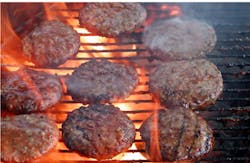Horse meat has been detected in frozen beef burgers sold in some of Britain's biggest supermarket chains, including Tesco, Lidl, Aldi and Iceland, according to the BBC. The largest proportion was found in Tesco Everyday Value Beef Burgers, where horse meat represented 29 percent of the total.
Ireland's Food Safety Authority and the British Food Standards Agency have launched a joint investigation, revealing that the meat came from three processing plants located in the Irish Republic and in England, which have been using imported products from the Netherlands and Spain. Two of these plants, Silvercrest Foods in Ireland and Dalepak Hambleton in Yorkshire, are owned by the ABP Food Group. Officials said the contaminated products were not hazardous to human health but have been removed from shops as a precaution. An estimated 10 million beef burgers have been removed from shelves overall.
It was also revealed that the Food Safety Authority of Ireland first identified the contaminated beef in November, but did not announce the results until it confirmed them with further tests. Meanwhile, thousands of the contaminated burgers may have been sold to consumers. The Food Standards Agency admitted that this was the first time tests for horse meat have been conducted in food products available on the British market.
In response to the quickly escalating scandal, Tesco offered an apology to all its customers for letting them down. Tim Smith, Tesco Group technical director, told the Daily Telegraph that there could be two possible explanations for the presence of horse meat in the burgers. One of them was illegality by suppliers at various levels of the supply chains and the other one was gross negligence. In either case, Tesco was committed to uncovering the truth, he said. As a precaution, the supermarket chain has withdrawn from sale all products from Silvercrest Foods, Smith stated.
Although the investigation is still in progress, food safety officials quoted by the Telegraph explained that the horse meat was probably sold as beef "filler", because it is up to four times cheaper. "Filler" meat, which is made of offcuts from the remnants of cattle carcases, is used in lower-cost meat products to bulk up the production.
British Prime Minister David Cameron called the situation "completely unacceptable" and stated that the responsibility should be taken by retailers. The Food Standards Agency announced that it was considering launching legal action, since under European Commission regulations it is illegal for suppliers and retailers to mislabel food.
Meanwhile, investigators revealed that of the total of 27 burger products analysed, traces of horse DNA were found in ten of them. Some 23 products sold as beef burgers contained pig DNA. Moreover, two in three of the 31 beef meal products that were analysed, including cottage pie, beef curry pie and lasagna, tested positive for pig DNA.
Tim Lang, professor of food policy at City University, London, commented that horse meat could have been sold in supermarkets for years but since no tests have been carried out there is no way to know. He criticized the Food Standards Agency for having a too-light approach and called for tougher regulation.
